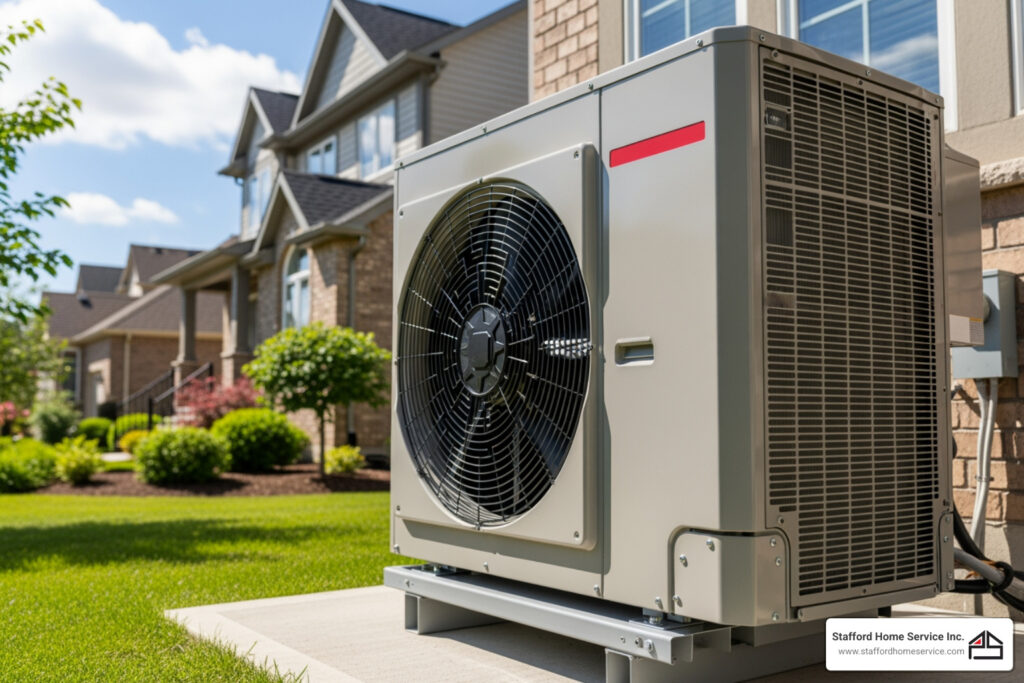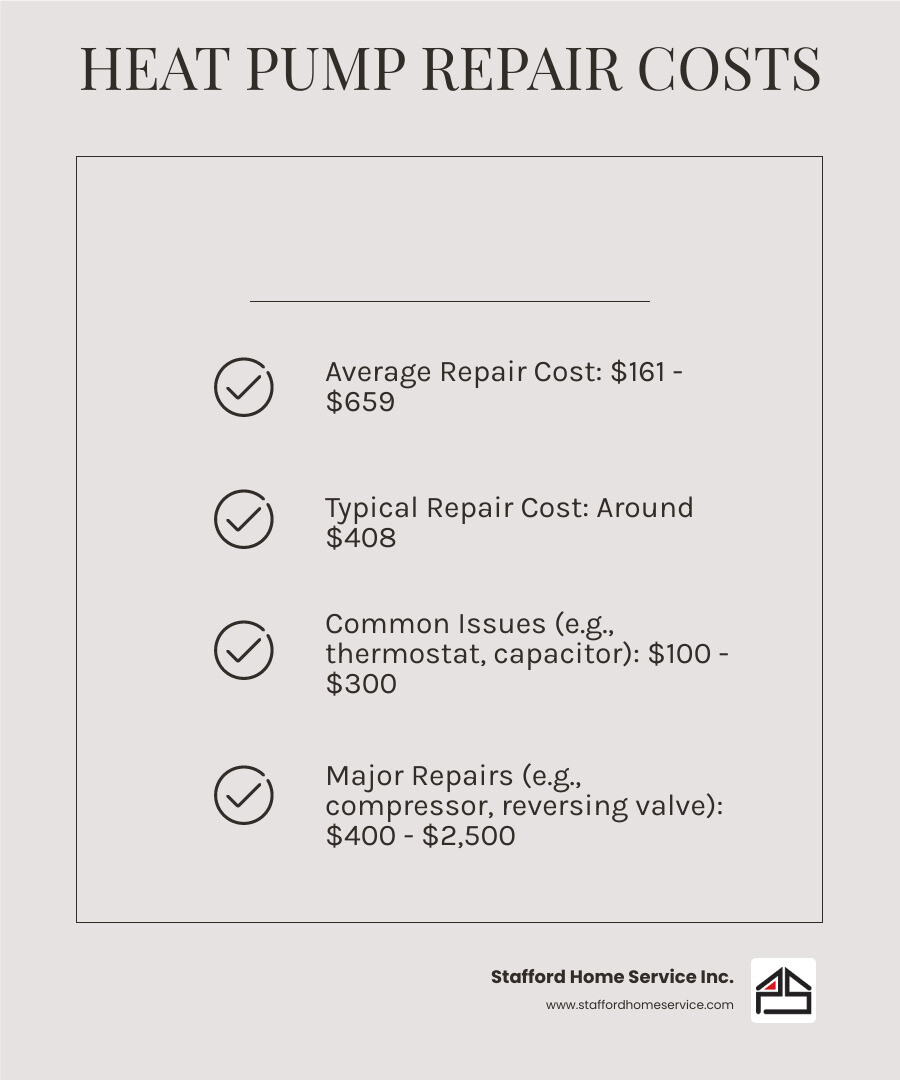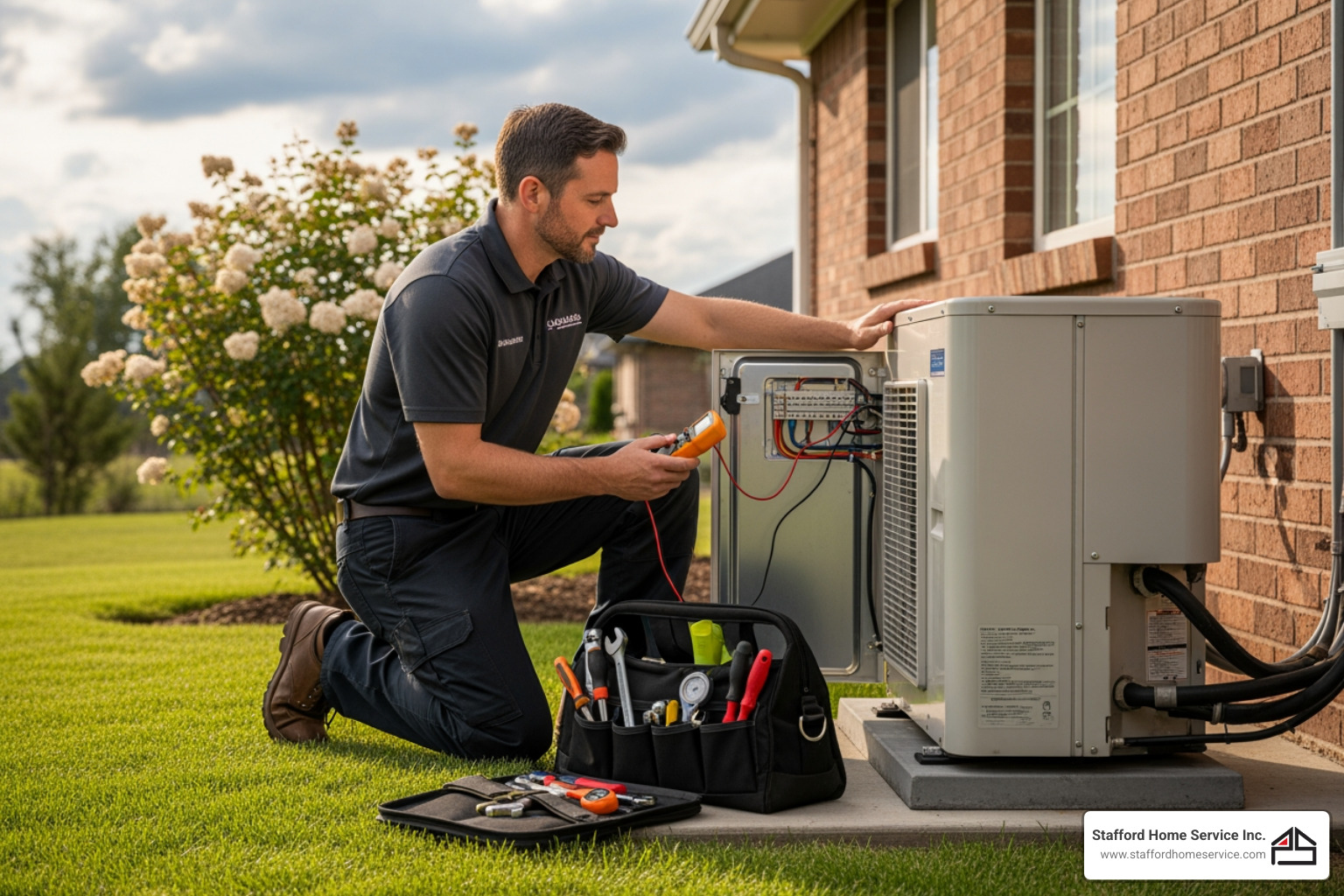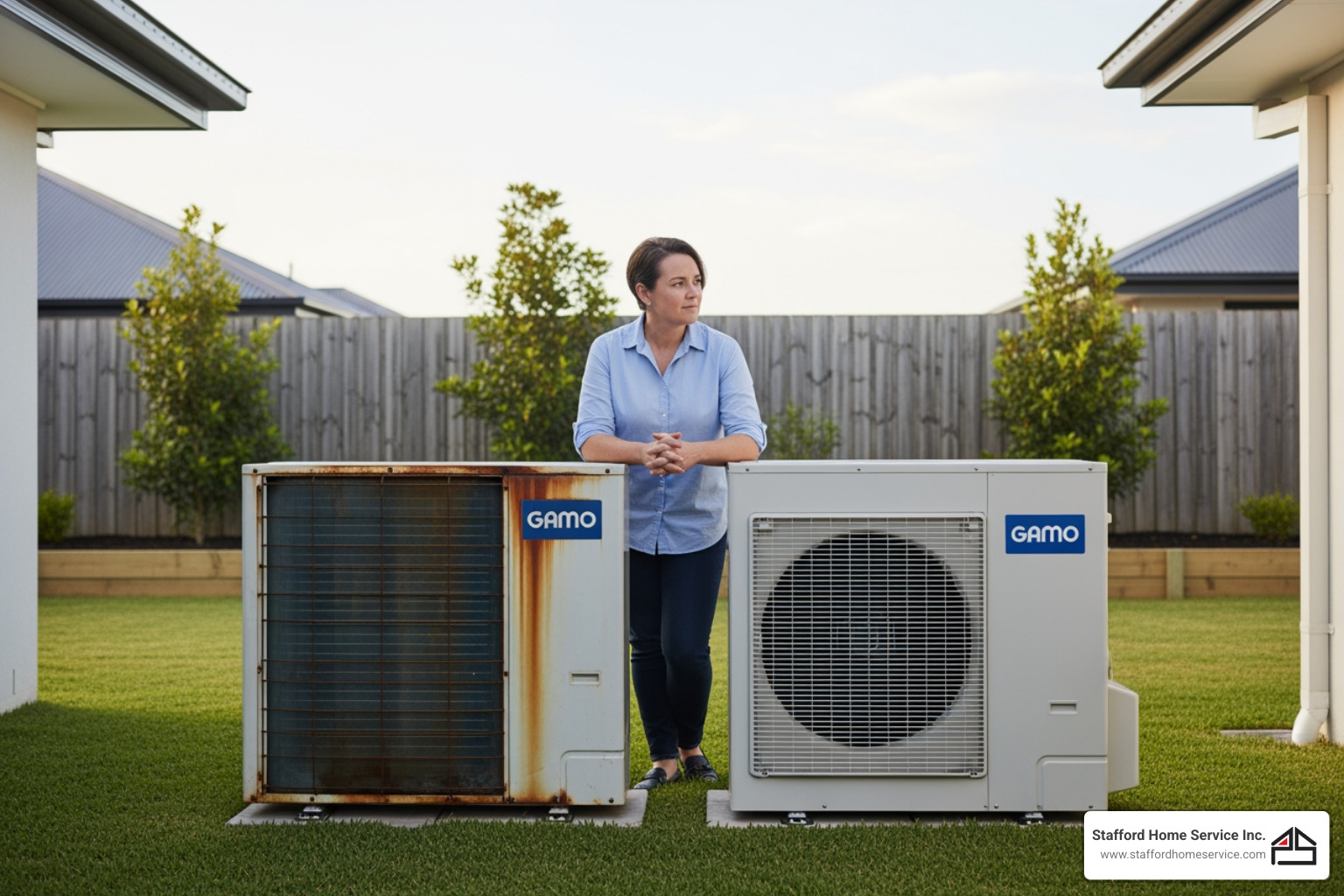Why Understanding Heat Pump Repair Costs Matters for Your Home
Heat pump repair cost is one of the first concerns homeowners face when their system stops working. If your heat pump has failed, you’re likely wondering what it will take to get your home comfortable again—and what the expense might be.
Quick Answer: What You Need to Know About Heat Pump Repair Costs
- Repair Costs Vary: The expense to fix a heat pump can range from minor to significant, depending on the issue.
- Common Repairs: Issues can include simple thermostat fixes, refrigerant leaks, or capacitor replacements.
- Major Component Repairs: More serious problems involve the compressor, reversing valve, or blower motor.
- Key Cost Factors: The final bill is influenced by your location, the specific repair, parts needed, and whether it’s an emergency service.
Heat pumps are efficient systems that provide both heating and cooling year-round. According to the Department of Energy (DOE), an air-source heat pump can deliver up to three times more heat energy than the electrical energy it consumes. But when something goes wrong, repair costs can vary dramatically based on the problem, your location, and the age of your system.
This guide breaks down what influences heat pump repair costs, helps you understand when repair makes sense versus replacement, and gives you the information you need to make confident decisions about your home comfort system.
If you need professional heat pump service in Mounds View, MN, learn more about our residential heating and cooling services, or contact Stafford Home Service Inc. for expert diagnosis and repair.
Common Heat Pump Problems and Their Impact on Costs
When your heat pump stops working properly, you’re facing more than just discomfort—you’re also wondering what it’ll cost to fix. The truth is, heat pump repair cost can vary dramatically depending on what’s gone wrong. A minor electrical issue might be a quick fix, while a major component failure could be a more significant expense.
Several factors determine what you’ll ultimately pay: the complexity of the problem, which parts need attention, and how much time the repair takes. An experienced technician can diagnose the issue efficiently and get your system back up and running.
Let’s walk through the most common heat pump problems and what they mean for your wallet.
Refrigerant Leaks and Recharging
Refrigerant is the substance that moves heat in your system. Unlike gas in a car, refrigerant is in a sealed system, so low levels almost always mean there’s a leak. A technician uses specialized tools to find and repair the source of the leak. After the repair, the system must be recharged with the correct amount of refrigerant. This process is governed by environmental regulations and requires a qualified professional. Ignoring a leak leads to poor performance, higher energy bills, and potential ice buildup on your unit. Addressing it quickly prevents further damage.
Electrical and Mechanical Failures
Your heat pump depends on a symphony of electrical and mechanical parts working together. When one of these components fails, your system might refuse to start or run inefficiently.
- Capacitors give your compressor and fan motors the electrical jolt they need to start. A faulty capacitor is often the culprit if your heat pump hums but won’t turn on. Replacing a capacitor is usually a straightforward repair.
- Contactors act as electrical switches that control power flow. When a contactor fails, it can prevent your entire system from operating.
- Fan motors keep air moving through your system. If you notice your outdoor fan isn’t spinning or indoor airflow seems weak, a fan motor might be failing. Replacement is often the best long-term solution.
- The blower motor moves conditioned air through your ductwork. When it fails, you might get little to no air from your vents. Standard blower motors are a common repair, while high-efficiency models represent a bigger investment.
Major Component Breakdown
Some heat pump components are so critical that their failure leads to a significant repair—and an important decision about whether to repair or replace your system.
- The compressor is your heat pump’s heart, pressurizing refrigerant to enable heat transfer. When a compressor fails, you’re facing one of the most expensive repairs. Its cost often leads homeowners to consider replacing the entire unit, especially if the system is aging.
- The reversing valve allows your system to switch between heating and cooling. If your heat pump gets stuck in one mode, the reversing valve is likely to blame. Replacing it is a moderately complex job.
- Condenser and evaporator coils are where heat exchange happens. These coils can develop leaks or get damaged over time. When coil damage is extensive, repair or replacement becomes necessary.
Control System Malfunctions
Even with working mechanical parts, your heat pump needs its “brain” to function. Control system issues can cause confusing symptoms.
- Thermostat problems are common and can mimic more serious issues, causing the system to not turn on, run constantly, or cycle erratically. Sometimes it’s a simple fix, while other times an upgrade to a smart thermostat is beneficial.
- In cold climates, your heat pump periodically enters a defrost cycle to prevent ice buildup. If the defrost control board fails, your unit can freeze up, leading to poor performance and potential damage.
- The expansion valve regulates refrigerant flow. When it malfunctions, you’ll notice inconsistent heating or cooling and reduced efficiency. This repair requires careful adjustment to ensure proper system operation.
Key Factors That Influence Your Heat Pump Repair Cost
Understanding the specific problem is just one piece of the puzzle when it comes to heat pump repair cost. Several external factors can significantly influence the overall expense, which helps explain why two seemingly similar repairs might have different price tags.
One of the biggest factors is simply where you live. Geographic location has a real impact on repair expenses. In our service areas across the Twin Cities—including Andover, Brooklyn Park, Eagan, and Minneapolis—the local cost of living can influence service rates. Minnesota’s cold winters mean heat pumps here work harder and face different challenges than systems in milder climates, which can affect the complexity of repairs. Technician hourly rates also vary by region, reflecting local market conditions.
Understanding Labor and Diagnostic Fees
Before any repair begins, a technician needs to determine what’s wrong with your system. This is where diagnostic and labor fees come into play. A diagnostic fee, or service call charge, covers the technician’s time, expertise, and travel to assess your system and identify the problem. It’s a trained professional using specialized tools and experience to pinpoint the malfunction.
Most reputable HVAC companies apply this diagnostic fee toward your total repair bill if you move forward with the service. Once the problem is identified, hourly labor rates for the actual repair work apply. These rates reflect the technician’s expertise and the overhead costs of running a professional service business. If you need immediate service outside regular business hours, expect to pay premium rates for that convenience. After-hours, weekend, and holiday service calls typically come with higher labor rates.
The Price of Parts and Availability
The components needed for your repair play a huge role in the final bill. OEM versus generic parts is often the first decision point. Original Equipment Manufacturer (OEM) parts are made by your heat pump’s manufacturer for your specific model. Generic or aftermarket parts might cost less but can sometimes affect system performance or longevity.
Your unit’s brand and model also matter. Different manufacturers use different components, and some brands use proprietary parts. High-efficiency units often have more expensive components because they’re more advanced. The complexity of the part itself is another factor. A simple capacitor is a small component, while a compressor is a sophisticated piece of machinery that represents a substantial investment.
Don’t forget to check your warranty coverage before authorizing repairs. If your heat pump is still under warranty, the parts might be covered, which can dramatically reduce your out-of-pocket expense. Warranties typically cover parts but may not cover labor.
How System Type Impacts Your Heat Pump Repair Cost
The type of heat pump you have also influences repair costs, since different systems have varying levels of complexity.
- Air-source heat pumps are the most common type. Because they’re so widespread, parts are generally available, and most HVAC technicians are familiar with servicing them.
- Ductless mini-splits are popular for homes without ductwork or for zoning. While efficient, their specialized components can lead to different repair considerations.
- Geothermal systems use the earth’s stable temperature for incredible efficiency and longevity. The underground loop system rarely needs repairs. When they are needed, repairs are typically to the indoor unit components, which are comparable to air-source systems. However, any issue with the underground loop can be extensive due to the excavation required.
- Water-source units are less common residentially and use a body of water as a heat source. Repair considerations depend on the accessibility of the water loop and any specialized components.
To Repair or Replace? Making the Right Financial Decision
At some point, every homeowner with a heat pump faces a critical decision: should we repair our existing system, or is it time to invest in a new one? This isn’t just about the immediate heat pump repair cost—it’s a bigger conversation about your home’s long-term comfort, energy efficiency, and financial health.
We understand this decision can feel overwhelming. You’re dealing with an unexpected expense and trying to balance immediate needs with future considerations. Let’s walk through the key factors that can help you make the right choice.
The Lifespan and Age of Your Heat Pump
The age of your heat pump tells an important story. Unlike a furnace or air conditioner that works seasonally, your heat pump runs year-round, which means more wear and tear.
Most heat pumps have a typical lifespan of 10 to 15 years. As your system ages beyond this range, you’ll likely notice it struggling more. Older units require more frequent service calls, and the frequency of repairs tends to accelerate as components reach the end of their useful life. If your heat pump is approaching or has exceeded its typical lifespan and needs a significant repair, it’s worth pausing to consider whether that repair makes financial sense.
When to Consider Replacement
A common guideline is to weigh the cost of a major repair against the investment in a new unit. If a repair represents a substantial fraction of the replacement cost, investing in a new system often makes more financial sense. When you’re facing a significant repair on an aging system, you’re making a large investment without the benefits of a new unit, such as improved efficiency or a fresh warranty.
When one major component fails on an older heat pump, it’s often a signal that other components aren’t far behind. Replacing one major part might buy you a year or two, but you could face another expensive repair before long.
A new heat pump brings several compelling benefits. Modern systems are significantly more energy-efficient, often reducing your monthly utility costs. You’ll enjoy improved reliability and the peace of mind that comes with a new warranty. New systems also typically provide better comfort, with more consistent temperatures and improved humidity control.
Signs It’s Time to Replace Your Heat Pump
Your heat pump will often tell you when it’s reaching the end of its service life. Recognizing these signals can help you plan for replacement on your terms.
- Unit is over 10 years old: Age alone doesn’t mandate replacement, but it shifts the calculation when weighing repair versus replacement.
- Frequent breakdowns: If you’re calling for service multiple times a year, those repair bills add up quickly.
- Rising energy bills: This can indicate your heat pump is losing efficiency and working harder to maintain temperature.
- Strange noises: Grinding, squealing, or banging noises can signal serious mechanical problems that may not be worth fixing on an old unit.
- Uneven heating or cooling: If some rooms are consistently uncomfortable, your heat pump may be failing to keep up with demand.
At Stafford Home Service Inc., our experienced technicians can help you evaluate your specific situation honestly. We’ll assess your system’s condition, discuss your options, and help you understand the true cost-benefit picture. Contact us to discuss your heat pump concerns and explore your options.
Frequently Asked Questions about Heat Pump Repairs
We understand you have questions, especially when faced with a malfunctioning heat pump. Here are answers to some of the most common inquiries we receive from homeowners in our service areas like Bloomington, Plymouth, and Woodbury, MN.
What is the average cost to repair a heat pump?
The heat pump repair cost varies significantly depending on the problem. Minor issues, like a thermostat adjustment, are naturally less involved than major component failures, such as a compressor replacement. The complexity of the repair, the parts needed, and labor all affect the final expense. The best approach is to have a professional diagnose the problem. An expert can give you an accurate assessment of what needs to be done and help you understand your options before any work begins.
Can regular maintenance help reduce repair costs?
Absolutely. Regular maintenance is one of the most effective ways to manage repair costs over the long term. During annual maintenance checks, technicians can identify and fix minor issues before they escalate into costly breakdowns. We clean coils, check refrigerant levels, inspect electrical connections, and ensure all components are operating optimally. This preventative care helps your system run more efficiently, which can lower utility bills and extend its overall lifespan. We strongly recommend scheduling annual maintenance for your heat pump to ensure it operates reliably and efficiently. It’s a small investment that pays dividends in comfort, efficiency, and peace of mind.
What are the most common heat pump problems?
While heat pumps are generally reliable, certain issues tend to pop up more frequently. Knowing these can help you understand what might be going on with your system.
- Refrigerant leaks are among the most common problems. When your system is low on refrigerant, it can’t effectively heat or cool your home.
- Electrical issues involving capacitors, contactors, or wiring are frequent culprits behind a heat pump failing to start or operate correctly.
- Frozen coils often indicate a problem with airflow, which could be due to a dirty air filter, low refrigerant, or a malfunctioning defrost cycle.
- Thermostat failure is another common issue that sends incorrect signals to your heat pump, leading to erratic operation or a system that won’t turn on.
These common problems highlight the importance of professional diagnosis. While you can check your thermostat settings or replace your air filter, most heat pump issues require the expertise of a certified HVAC technician to identify the root cause and recommend the most effective solution.
Conclusion: Ensuring Reliable Home Comfort
Making sense of heat pump repair cost doesn’t have to feel overwhelming. We’ve walked through the key factors that shape your repair expenses—from common problems like refrigerant leaks and electrical failures, to understanding how location, parts, and system age all play a role. We’ve also tackled that tough question every homeowner eventually faces: when does it make more sense to replace rather than repair?
There’s no one-size-fits-all answer. Sometimes a straightforward repair gets your system back on track. Other times, especially with an aging unit facing a major failure, investing in a new, energy-efficient system is the smarter decision. What matters most is having the right information to make a choice that works for your home, budget, and long-term comfort.
At Stafford Home Service Inc., we’re committed to helping you steer these decisions with honesty and expertise. Our experienced owners and technicians bring quality workmanship to every job. We stand behind our work with complete customer satisfaction and the Daikin Comfort Promise, and we offer financing options to make your home comfort solutions more accessible.
Your home deserves reliable heating and cooling. When your heat pump isn’t working the way it should, we’re here to provide the professional service and effective solutions you need.
Contact us for your residential heating and cooling needs in Mounds View, MN and throughout the Twin Cities area, including Apple Valley, Burnsville, Eagan, and Maple Grove. Let’s restore comfort to your home with the professionalism and care you can count on.







